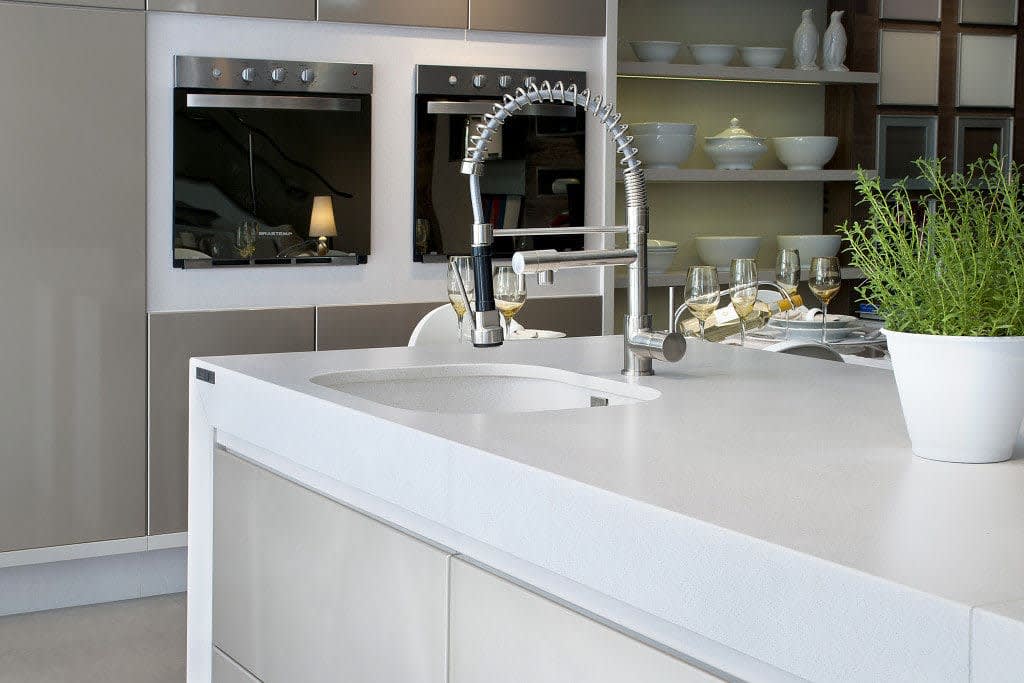When it comes to kitchen countertops, the standard thickness is usually 1 1/4 inches (or 3 cm). In this guide, we’ll walk you through everything you need to know—from the usual thickness and depth to all the little details—so you can plan your kitchen project with confidence.

Image Source: images.ctfassets.net
Delving Into Kitchen Countertop Thickness
A kitchen countertop is more than just a flat surface. It’s a workspace, a design element, and an investment. Getting the kitchen countertop thickness right impacts how it looks, how durable it is, and how easy it is to use. This countertop thickness guide will cover common countertop sizes, countertop material thickness, and what to think about when making your choice.
Common Countertop Materials and Their Thickness
The material you choose for your countertop impacts the ideal countertop thickness. Here’s a quick look:
- Granite: Granite countertop thickness typically is 1 1/4 inches (3 cm), but you can also find thinner (3/4 inch or 2 cm) and thicker (2-3 inches or 5-7.5 cm) slabs.
- Quartz: Like granite, quartz countertop thickness is commonly 1 1/4 inches (3 cm). It’s also available in 3/4 inch (2 cm) thickness.
- Solid Surface (Acrylic): This material often comes in 1/2 inch (1.25 cm) and 3/4 inch (2 cm) thicknesses.
- Laminate: Laminate is usually bonded to a substrate like particleboard or MDF, resulting in a total thickness of 1 inch (2.5 cm) to 1 1/2 inches (3.8 cm).
- Wood (Butcher Block): Butcher block countertops can vary widely in thickness, from 1 1/2 inches (3.8 cm) to 4 inches (10 cm) or more.
- Stainless Steel: Stainless steel is usually wrapped around a core material, resulting in a total thickness of around 1 1/2 inches (3.8 cm).
- Concrete: Concrete countertop thickness can range from 1 1/2 inches (3.8 cm) to 2 inches (5 cm) or more.
Standard Kitchen Counter Height
Typical kitchen counter height is 36 inches (91 cm). This height works well for most adults. This standard countertop depth, combined with the countertop thickness, creates a comfortable workspace. The kitchen worktop dimensions are often designed around this height.
The Role of Standard Countertop Depth
Standard countertop depth usually measures 25 inches (63.5 cm). This depth gives enough space for tasks without being too far to reach the back of the counter. The standard countertop depth works well with typical kitchen layouts and appliances.
Granite and Quartz Countertop Thickness: What You Should Know
Granite and quartz are popular choices for kitchen countertops. Their countertop material thickness plays a role in their durability and appearance.
Granite Countertop Thickness
Granite countertop thickness affects its strength and cost.
- 3/4 inch (2 cm): Thinner granite needs more support. It is usually cheaper, but it might not be as durable. It is a good choice for areas with less use, like a bathroom vanity.
- 1 1/4 inches (3 cm): This is the most common granite countertop thickness. It balances cost and durability. It is strong enough for most kitchen tasks.
- 2-3 inches (5-7.5 cm): Thicker granite makes a statement. It is very durable and can handle heavy use. It is also more expensive.
Quartz Countertop Thickness
Quartz countertop thickness also impacts its performance.
- 3/4 inch (2 cm): Like granite, thinner quartz needs more support. It can be a good choice for areas with less use or for a modern, minimalist look.
- 1 1/4 inches (3 cm): This is the standard quartz countertop thickness. It is strong, durable, and easy to maintain.
Comparing Granite and Quartz: What’s the Difference?
Both granite and quartz are great choices, but their countertop material thickness is slightly different. Granite is a natural stone, so its thickness can vary slightly. Quartz is man-made, so its thickness is more consistent.
| Feature | Granite | Quartz |
|---|---|---|
| Material | Natural Stone | Engineered Stone |
| Standard Thickness | 1 1/4 inches (3 cm) | 1 1/4 inches (3 cm) |
| Other Thicknesses | 3/4 inch (2 cm), 2-3 inches | 3/4 inch (2 cm) |
| Consistency | Varies Slightly | More Consistent |
| Sealing | Usually Required | Not Usually Required |
| Cost | Varies widely based on grade | Generally consistent pricing |
Choosing the Right Countertop Thickness: Factors to Consider
Selecting the ideal countertop thickness depends on several factors.
Structural Support
The thicker the countertop, the less support it needs. If you choose a thinner countertop, you might need to add extra support to prevent cracking or breaking. Your cabinet design plays a big role in this.
Edge Profile
The edge profile is how the edge of your countertop is shaped. A thicker countertop gives you more options for edge profiles. For example, a thicker countertop can handle a more decorative edge.
Cost
Thicker countertops usually cost more. This is because they need more material and can be harder to install. Consider your budget when choosing your countertop thickness.
Aesthetics
The countertop thickness can affect the overall look of your kitchen. A thicker countertop can create a more luxurious look. A thinner countertop can create a more modern look.
Countertop Material
Different materials have different strength and weight characteristics. The inherent properties of your countertop material should affect your decision for a countertop thickness.
How Countertop Thickness Affects Installation
The kitchen countertop thickness impacts the installation process.
Weight
Thicker countertops are heavier. This means they need more people to lift and install them. It also means your cabinets need to be strong enough to support the weight.
Seams
If your countertop needs seams, the thickness can affect how visible they are. Thicker countertops can hide seams better than thinner ones.
Leveling
Leveling is important for any countertop installation. Thicker countertops can be harder to level because of their weight.
Tools and Equipment
Installing thicker countertops might require special tools and equipment. Make sure your installer has the right tools for the job.
What is the Ideal Countertop Thickness?
The ideal countertop thickness depends on your specific needs and preferences. There is no one-size-fits-all answer. However, 1 1/4 inches (3 cm) is a good choice for most kitchens. It balances cost, durability, and aesthetics.
When to Choose a Thinner Countertop (3/4 inch or 2 cm)
- Budget: Thinner countertops are usually cheaper.
- Modern Look: Thinner countertops can create a sleek, modern look.
- Low-Use Areas: Thinner countertops are fine for areas that don’t get heavy use, like a bathroom vanity or a small kitchen island.
When to Choose a Thicker Countertop (2-3 inches or 5-7.5 cm)
- Durability: Thicker countertops are very durable.
- High-End Look: Thicker countertops can create a luxurious look.
- Statement Piece: Thicker countertops can be a focal point in your kitchen.
Other Considerations for Kitchen Worktop Dimensions
Beyond countertop thickness and depth, other dimensions matter in kitchen design.
Backsplash Height
The backsplash is the material that covers the wall behind your countertop. Common backsplash heights are 4 inches (10 cm), 6 inches (15 cm), and 18 inches (46 cm).
Overhang
The overhang is the amount the countertop extends beyond the cabinets. A standard overhang is 1 inch (2.5 cm). This protects the cabinet faces.
Island Size
If you have a kitchen island, its size and shape can affect the countertop thickness you choose. A large island might need a thicker countertop for support.
Maintaining Your Countertop Based on Thickness
How you care for your countertop depends on its material and thickness.
Sealing
Natural stone countertops like granite usually need to be sealed to protect them from stains. The frequency of sealing depends on the type of stone and its thickness.
Cleaning
Clean your countertop regularly with a mild soap and water solution. Avoid harsh chemicals that can damage the surface.
Avoiding Damage
Protect your countertop from heat and scratches. Use cutting boards and trivets to prevent damage.
FAQ: Common Questions About Kitchen Countertop Thickness
- What is the standard kitchen countertop thickness? The standard kitchen countertop thickness is 1 1/4 inches (3 cm).
- Can I use a thinner countertop? Yes, you can use a thinner countertop, but it might need more support.
- Who is responsible for deciding countertop thickness? Your contractor, designer, or you, after consulting with them, are responsible for deciding countertop thickness, depending on your project and budget.
- What is the typical kitchen counter height? The typical kitchen counter height is 36 inches (91 cm).
- Does countertop thickness affect the price? Yes, thicker countertops usually cost more.
- What is standard countertop depth? Standard countertop depth is 25 inches (63.5 cm).
- Are thicker countertops more durable? Yes, thicker countertops are generally more durable.
- How do I choose the right countertop thickness? Consider your budget, style, and needs when choosing the right countertop thickness.
By thinking about these factors, you can choose the ideal countertop thickness for your kitchen.

Hi, I’m Larry Fish, the mind behind MyGrinderGuide.com.. With a passion for all things kitchen appliances, I created this blog to share my hands-on experience and expert knowledge. Whether it’s helping you choose the right tools for your culinary adventures or offering tips to make your kitchen more efficient, I’m here to guide you. My goal is to make your time in the kitchen not only easier but also enjoyable! Welcome to my world of kitchen mastery!
